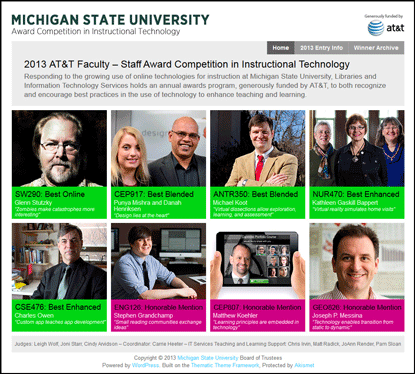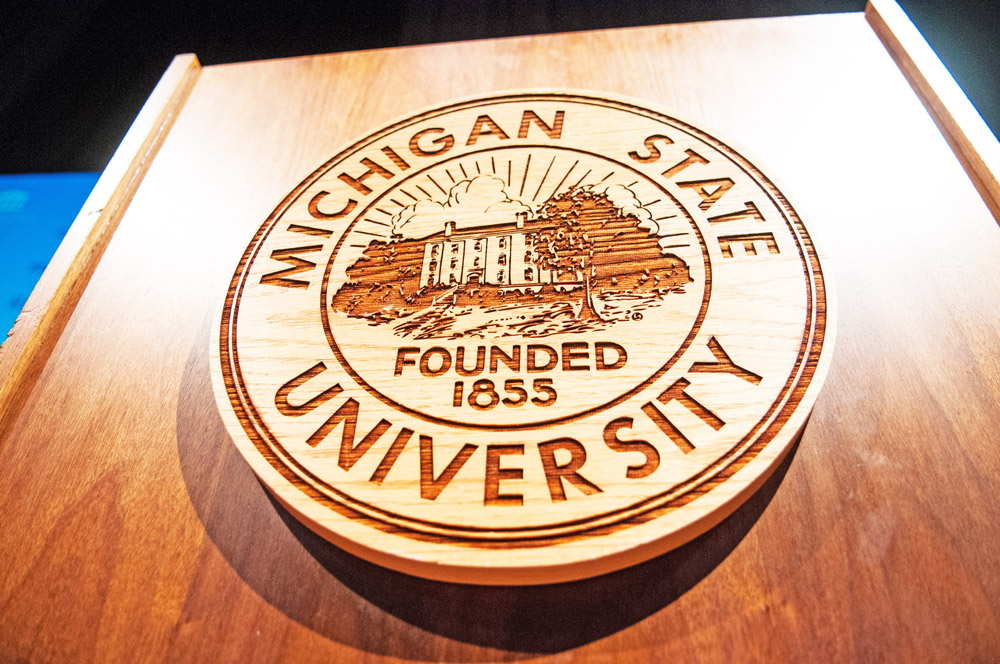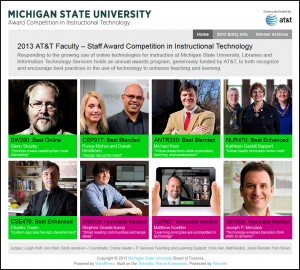Five outstanding online and blended courses and technology enhancements in a course from Michigan State University were selected as recipients of this year’s AT&T Faculty-Staff Awards in Instructional Technology.

In the coming academic year, these winners will present their innovations to the public in venues such as the Instructional Technology Brown Bag Seminar Series and the Breakfast Series: Conversations in Online and Blended Pedagogy, hosted by MSU IT Services.
“Instructional technology keeps growing throughout higher education and that definitely includes Michigan State University. The AT&T Instructional Technology Awards is a way we recognize innovative MSU faculty and staff who are making exemplary contributions to the art and science of online instruction,” explained Carrie Heeter, awards coordinator for the Office of the CIO and IT Services, and professor of Telecommunication, Information Studies & Media.
“I look forward to this every year because it gives me an inside peek at how some of the great innovators are shaping the future of MSU in bold and exciting ways,” Heeter continued.
MSU established the AT&T Instructional Technology Awards program in 2005, through a gift from AT&T (then SBC). The award program is administered by the Office of the CIO and IT Services. Since its inception, 55 instructional technology innovations in MSU courses have received this award.
2013 AT&T Awards
The winning innovations and honorable mentions of the 2013 AT&T Faculty-Staff Awards in Instructional Technology are:
BEST FULLY ONLINE COURSE
Glenn Stutzky — SW 290: Surviving the Coming Zombie Apocalypse: Catastrophes and Human Behavior
SW 290 created a simulated game-like educational experience where the presence of zombies creates a sense of urgency as student survival groups make choices. Zombies (as well as viral marketing, Facebook, YouTube, Twitter, and filmmaking) make catastrophes more interesting.
HONORABLE MENTION
Stephen Grandchamp — ENG 126: Introduction to Literary Genres
ENG 126 created small reading communities, allowing for digital projects not typical of English courses that nevertheless remain loyal to literary studies’ goals, and giving each student abundant and frequent individual feedback on their work.
Matthew Koehler — CEP 807 / ED 870: Capstone Portfolio Course, College of Education
Learning principles are embedded in the technology used throughout CEP 807 / ED 870. A second innovation is the course website, designed in WordPress and augmented with some unique properties.
BEST BLENDED COURSE
Michael Koot — ANTR 350: Human Gross Anatomy
In ANTR 350, virtual dissections enable exploration, learning, and assessment. A mix of recorded and live lectures plus customized integration of McGraw Hill’s Anatomy and Physiology Revealed virtual dissection result in effective learning in this large enrollment course.
Punya Mishra and Danah Henriksen — CEP 917: Knowledge Media Design
With design as the intellectual/academic focus, CEP 917 was a unique opportunity to cover a wide variety of related topics and technologies, while also making the course itself an example of design in process.
BEST TECHNOLOGY ENHANCEMENT
Charles Owen — CSE 491-003: Mobile Application Development
Students in CSE 491-003 download the custom, instructor-created mobile app to their mobile Android device as a way to complement lecture presentations and to provide tools for experimenting with these ideas during class.
Kathleen Gaskill Bappert — NUR 470: Community and Population Health
NUR 470’s virtual reality simulation helps students prepare for real home visits. Students experience realistic situations within the safety net of virtual reality and learn from their mistakes.
HONORABLE MENTION
Joseph P. Messin — GEO 826: Geocomputation
GEO 826 transitioned from static and traditional to dynamic and web-enabled. PowerPoint lectures were converted into a Mathematica web enabled notebook that was used for live lectures and student assignments.



